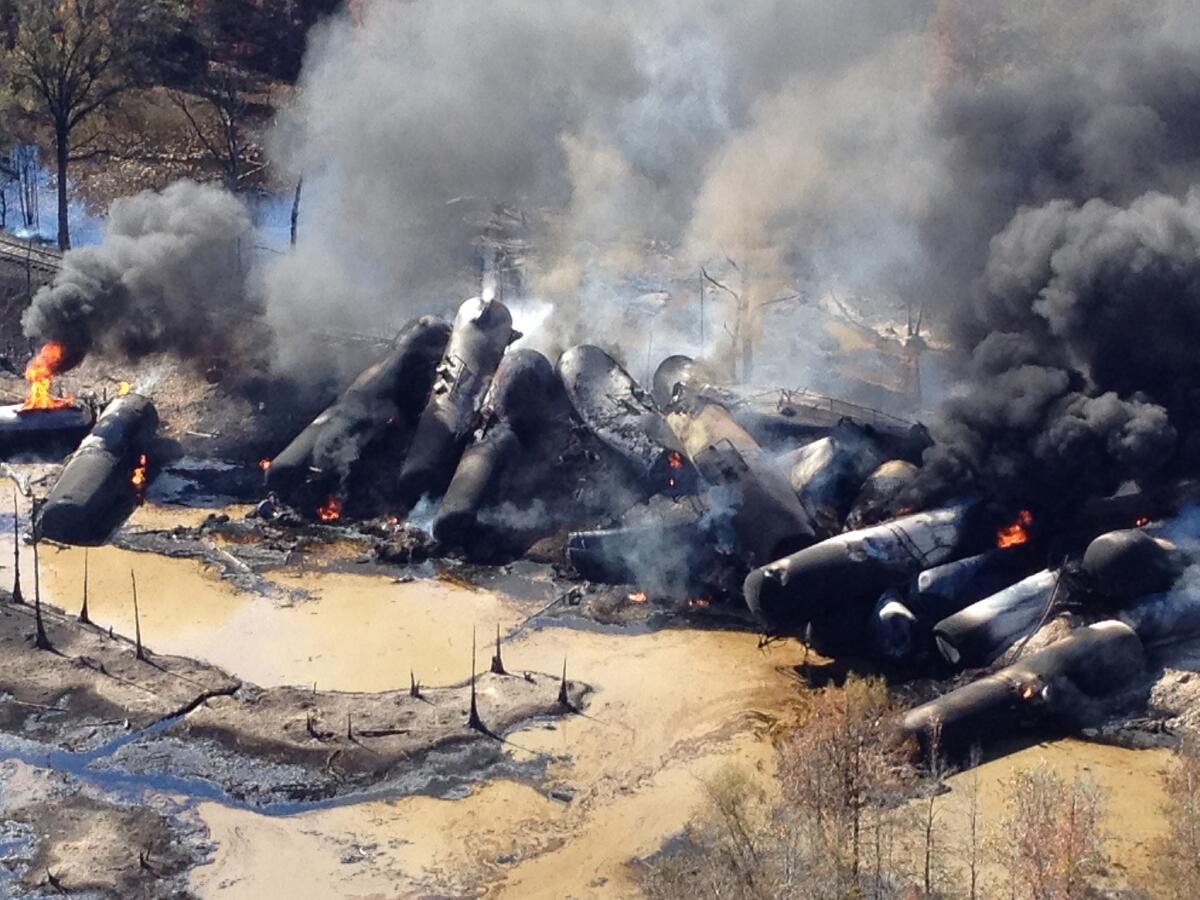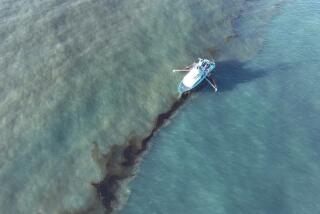Train in Alabama oil spill was carrying 2.7 million gallons of crude

- Share via
A train that derailed and exploded in rural Alabama was hauling 2.7 million gallons of crude oil, according to officials.
The 90-car train was crossing a timber trestle above a wetland near Aliceville late Thursday night when approximately 25 rail cars and two locomotives derailed, spilling crude oil into the surrounding wetlands and igniting a fire that was still burning Saturday.
Each of the 90 cars was carrying 30,000 gallons of oil, said Bill Jasper, president of the rail company Genesee & Wyoming at a press briefing Friday night. It’s unclear, though, how much oil was spilled because some of the cars have yet to be removed from the marsh.
“Most of the cars did not spill all of the product that was inside it,” Don Hartley, a regional coordinator for the Alabama Emergency Management Agency, told the Los Angeles Times.
Emergency responders have to wait until the fire has burned out, Hartley said.
Hartley said that the marsh where the oil spilled is stagnant, so the oil hasn’t spread to other water systems. Scott Hughes, spokesman for the Alabama Department of Environmental Management, told The Times that responders had set up booms to absorb some of the oil.
“Typically wetlands are a sanctuary for a variety of different types of aquatic species, so once we’re able to get in and assess environmental impacts, we’ll certainly look at any impacts to aquatic organisms and other types of wildlife,” Hughes told The Times.
There are extensive wetlands near Aliceville, a town of about 2,400 in western Alabama, according to the state’s Forestry Commission website.
Hughes said Friday that a check of the water quality of the nearby drinking wells came up clean. The U.S. Environmental Protection Agency has been at the scene since Friday monitoring air quality in the region.
There are more than 100 people from various local, state and federal agencies surveying the scene, Hartley said.
Hartley said 21 cars were still in the marsh, but that most of the other cars had been moved back onto the track. The most damaged cars in the water will be removed last. The 60-foot-long, 10-foot-high wooden trestle, which also caught on fire, will have to be rebuilt. That will take about a week, Hartley said.
The cause of the crash is under investigation, and will probably take weeks to determine. The train, which was en route from Amory, Miss., to Walnut Hill, Fla., was traveling below the posted track speed of 40 mph, according to Jasper.
“No issues have been found with the performance of the train’s two-man crew,” reads a statement from the train company.
The track was last inspected Monday, and the most recent train to traverse the section of track where the crash occurred passed the site approximately 2.5 hours before the derailment, according to the statement.
The explosion of an oil train in Lac-Megantic, Canada, in July has fueled criticism regarding the use of rail to move oil. Railroads are carrying 25 times more crude oil than they were five years ago. In that incident, a train with 72 tank cars carrying crude oil from North Dakota’s Bakken Shale fields ignited an inferno in the city, The Times reported in September.
Hartley said that the Alabama train probably originated from North Dakota.
ALSO:
Hawaii House passes same-sex marriage bill
With Hawaii vote, same-sex marriage wave continues to grow
Guns & Ammo editor steps down after gun rights column stirs outrage
Twitter: @skarlamangla
More to Read
Sign up for Essential California
The most important California stories and recommendations in your inbox every morning.
You may occasionally receive promotional content from the Los Angeles Times.











